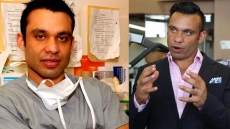TORONTO — The case of a Toronto father who pulled his three young children out of music class because it was against his Muslim faith has sparked a public debate, and education experts don't seem to agree on how school boards should deal with such cases.
Mohammad Nouman Dasu has been engaged in a three-year fight with the Toronto District School Board over his decision to take his children home for an hour during music class, according to the Globe and Mail, which first reported about the case earlier this week.
The newspaper said the TDSB tried to accommodate the family by offering a variety of solutions, including one that would see the children learn about the history of music in Islam, but the father turned them down.
A TDSB spokesman declined to discuss the case with The Canadian Press on Thursday citing privacy reasons, but he said the board "always works with parents to try to find some happy medium" while at the same time still following Ministry of Education's rules.
"Unfortunately we can't offer exemptions because we are required to teach the Ontario curriculum," Ryan Bird said.
Lauren Bialystok, an assistant professor in ethics and education at the University of Toronto, believes the school board did the right thing by refusing to exempt the children from music class.
"An exemption gives too much power to parental management of the child's education," she said. "It does a disservice to the student in question and to that student's peers and it communicates that our diversity is such that we can't live together or learn about different things together. That's a very dangerous message."

John Ippolito, an associate professor in the faculty of education at York University, said he believes schools are doing a pretty good job in accommodating a whole slew of parental concerns, but the problem should never reach a standoff.
"This is a disaster, this is a situation that has to be avoided at all costs," he said.
The problem, Ippolito said, lies in the question "where do you draw the line?"
"That's the wrong question, that's inflammatory," he said. "The kind of questions we should be asking is 'how do we move this conversation forward?'"
Ippolito believes the solution to these problems, which he said pop up all the time, rests in the relationships between educators and parents. He's been researching those dynamics over the past 15 years.
"One thing I've come across in my research is this myth that some minority parents are never going to change — that's baloney, that's not true," he said.
At a school in Markham, Ont., Ippolito brought ethnic minority parents, teachers and administrators together over food once a month to discuss issues as part of a research project.
The parents and educators began the year sitting on opposite ends of the table, he said.

"It highlighted to me that the relationship between minority parents and teachers is profoundly dysfunctional," he said.
Over the year, he said, the parents and teachers got closer physically and philosophically.
"In our experience, if that's sustained over a number of years things begin to change and a different culture takes shape within the school," Ippolito said.
"Parents are less hesitant to go in and talk to teachers and administrators. And educators become more literate in how to deal with parents, especially cultural minorities. It's not rocket science, but it has a profound impact on student academic achievement and student socialization in the school."





